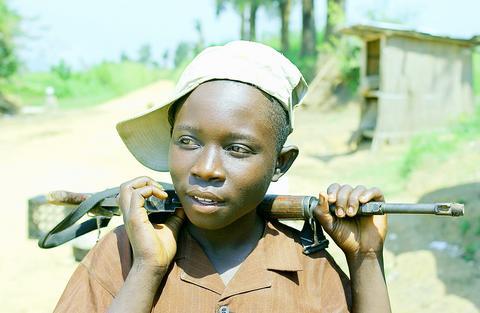A small boy of five stood on Bunia's main street gravely handing his orange plastic assault rifle to an older boy of about 15 in camouflage trousers and a fuschia pink T-shirt, a real AK-47 slung across his chest.
The older boy inspected it silently, a vacant look in his eyes, seemingly open to the idea it might work, just like his own rifle.

PHOTO: AFP
If Ituri, the most strife-torn district in eastern Democratic Republic of Congo (DRC), was once famed for the beauty of its forests and the music of its pygmies, it is now notorious for its child soldiers, many of whom are still young enough to ask strangers for sweets or biscuits.
This is in a country where child soldiers are the norm. A recent report by the UN accused 10 movements fighting in DRC of using fighters under the age of 18.
Aid workers in Ituri estimate that half of those fighting in Ituri are underage.
"It's a bit different here in Ituri in that the average age is younger and there is less forced recruitment (than elsewhere in DRC) and more voluntary recruitment. It's families and communities who send the children, the communities see it as their own protection," Johannes Webenig, the head of UNICEF for eastern DRC, told AFP in Bunia.
"You have to contribute to the war effort and there are different ways of contributing, one being to send a child to fight," he said.
The leaders of Ituri's armed groups like to play down the problem. Thomas Lubanga, the head of the Union of Congolese Patriots (UPC), the group that currently controls Bunia, claims he has "just a handful" of child soldiers and that all are orphans who are better off among his fighters than they would be out on the streets.
One of his opponents, Mathieu Ngudjolo, the leader of the Lendu Front for Patriotic Resistance in Ituri (FRPI) dismisses the problem.
Ghislain, a ragged child of 12 on the outskirts of Bunia, seemed flattered by the interest in the shots he had just fired into the air.
"Have I ever killed anyone? Yes I've killed five men already", he said proudly, brandishing, like his six fellow child soldiers, a rifle in one hand and a sharpened stick in the other.
For Ituri's boy soldiers, the line between real and make-believe is a thin one.
In the ranks of FRPI at a camp outside town, the boys have taken to dressing up. One wears a red straw hat of the style favored by the late Princess Diana. Another, not to be outdone, has made a headdress out of a baseball cap with a blue nylon tablecloth wrapped around it.
Yet others, a little older and fully aware of the fear they already inspire thanks to their weapons, have accentuated the effect by wearing wigs that give them dreadlocks flowing to the waist or a white papier-mache mask with a dehumanizing effect.

Kehinde Sanni spends his days smoothing out dents and repainting scratched bumpers in a modest autobody shop in Lagos. He has never left Nigeria, yet he speaks glowingly of Burkina Faso military leader Ibrahim Traore. “Nigeria needs someone like Ibrahim Traore of Burkina Faso. He is doing well for his country,” Sanni said. His admiration is shaped by a steady stream of viral videos, memes and social media posts — many misleading or outright false — portraying Traore as a fearless reformer who defied Western powers and reclaimed his country’s dignity. The Burkinabe strongman swept into power following a coup in September 2022

‘FRAGMENTING’: British politics have for a long time been dominated by the Labor Party and the Tories, but polls suggest that Reform now poses a significant challenge Hard-right upstarts Reform UK snatched a parliamentary seat from British Prime Minister Keir Starmer’s Labor Party yesterday in local elections that dealt a blow to the UK’s two establishment parties. Reform, led by anti-immigrant firebrand Nigel Farage, won the by-election in Runcorn and Helsby in northwest England by just six votes, as it picked up gains in other localities, including one mayoralty. The group’s strong showing continues momentum it built up at last year’s general election and appears to confirm a trend that the UK is entering an era of multi-party politics. “For the movement, for the party it’s a very, very big

ENTERTAINMENT: Rio officials have a history of organizing massive concerts on Copacabana Beach, with Madonna’s show drawing about 1.6 million fans last year Lady Gaga on Saturday night gave a free concert in front of 2 million fans who poured onto Copacabana Beach in Rio de Janeiro for the biggest show of her career. “Tonight, we’re making history... Thank you for making history with me,” Lady Gaga told a screaming crowd. The Mother Monster, as she is known, started the show at about 10:10pm local time with her 2011 song Bloody Mary. Cries of joy rose from the tightly packed fans who sang and danced shoulder-to-shoulder on the vast stretch of sand. Concert organizers said 2.1 million people attended the show. Lady Gaga

SUPPORT: The Australian prime minister promised to back Kyiv against Russia’s invasion, saying: ‘That’s my government’s position. It was yesterday. It still is’ Left-leaning Australian Prime Minister Anthony Albanese yesterday basked in his landslide election win, promising a “disciplined, orderly” government to confront cost-of-living pain and tariff turmoil. People clapped as the 62-year-old and his fiancee, Jodie Haydon, who visited his old inner Sydney haunt, Cafe Italia, surrounded by a crowd of jostling photographers and journalists. Albanese’s Labor Party is on course to win at least 83 seats in the 150-member parliament, partial results showed. Opposition leader Peter Dutton’s conservative Liberal-National coalition had just 38 seats, and other parties 12. Another 17 seats were still in doubt. “We will be a disciplined, orderly